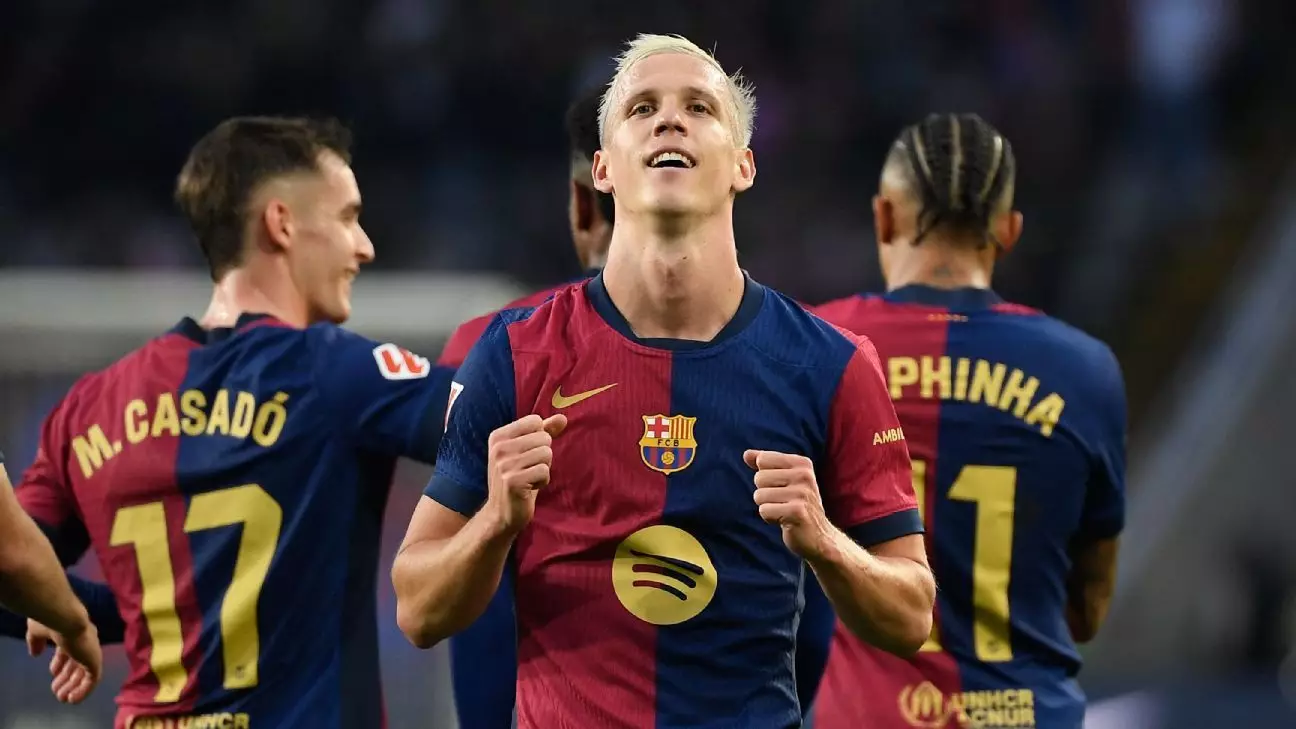Dani Olmo made a remarkable comeback in Barcelona’s recent 3-1 victory over Espanyol, where he scored two goals in his first start since September. His performance not only marked a significant personal achievement after a month-long injury layoff but also propelled Barcelona further ahead at the top of La Liga, extending their lead to nine points after just 11 matches. Olmo expressed his enthusiasm about returning to the pitch, emphasizing his desire for greater contributions to the team moving forward.
His robust performance is particularly impressive, considering Olmo is still in the process of getting back to peak fitness. Joining the Catalan side for €60 million from RB Leipzig during the summer, he has quickly adjusted to La Liga, accumulating five goals across five appearances, demonstrating his capacity to score effectively even in limited playing time. With an impressive average of 1.67 goals per 90 minutes, Olmo’s ability to impact the game is undeniable, adding a vital dimension to an already potent attacking lineup.
Barcelona’s attacking proficiency is evident as they now boast an astounding 40 goals in La Liga this season. The team showcases a diverse attacking threat, marking them as one of the most formidable in Europe. Specifically, they are the only club in the continent’s top five leagues to have four players each scoring five or more goals. Alongside Olmo, the attacking arsenal includes Robert Lewandowski, Raphinha, and the young talent Lamine Yamal. This multi-faceted scoring capability highlights Barcelona’s depth and versatility in their offensive strategy.
Olmo highlighted the teamwork involved in their success, noting the contributions from not just forwards but also midfielders who are increasingly part of the attack. The team’s ability to play direct football and create ample opportunities emphasizes their aggressive approach on the field, illustrating a cohesive unit where every player is committed to contributing to the scoreline.
Even within this context of victory, coach Hansi Flick admitted there were concerns regarding the team’s performance, particularly in the second half. Barcelona’s inability to maintain control after a dominant first half against Espanyol exposed areas for improvement. Although ecstatic about capturing the win in his inaugural Catalan derby, Flick noted that the players would need to step up their performance for an upcoming Champions League clash against Red Star Belgrade, emphasizing the importance of concentration and avoiding unforced errors.
Flick’s concerns about player focus resonate with the unpredictable nature of football, where lapses in concentration can lead to significant consequences. He acknowledged the team’s strong season thus far but urged his players to elevate their performance levels as they enter a critical phase of competitions.
The day was not only about the football match; it was imbued with a sense of somber reflection due to the recent floods in Spain, which resulted in significant loss of life. Prior to kick-off, a minute’s silence was observed, setting a poignant tone for the derby. The impact of such tragedies extends beyond the football pitch, affecting players emotionally. Injured forward Ferran Torres, hailing from a region heavily impacted by the floods, decided against attending the derby, citing personal struggles.
Flick’s response to Torres’ absence highlighted a deep understanding of the players’ realities, emphasizing that life transcends the game. Such moments serve as reminders of the greater societal issues at play and the emotional contexts that athletes must navigate alongside their professional commitments.
While Dani Olmo’s return is a positive development for Barcelona, the team faces the ongoing challenge of maintaining performance consistency. With crucial matches on the horizon, the blend of resilience and camaraderie amongst the players will be vital for sustaining their current trajectory in both La Liga and European competitions. The challenges posed by external factors, such as recent natural disasters, remind the footballing world of the human element that underlies sport, even amidst competitive fervor. As Barcelona strives toward sustained dominance, the focus will inevitably shift toward improvement, resilience, and a shared commitment to excellence on and off the pitch.

Leave a Reply